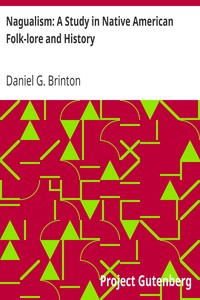Nagualism: A Study in Native American Folk-lore and History
Author: Daniel G. (Daniel Garrison) Brinton
Bookshelves: Culture/Civilization/Society, History - American, Category: Archaeology & Anthropology, Category: History - Other, Category: Mythology, Legends & Folklore

Summary
"Nagualism: A Study in Native American Folk-lore and History" by Daniel G. Brinton is a scholarly exploration of a specific aspect of Native American culture, written in the late 19th century. The text delves into the phenomenon of Nagualism, a belief system that encompasses a unique form of folk-magic, sorcery, and spiritual practices among various tribes in Mexico and Central America. It examines the cultural and historical significance of Nagualism, its practitioners known as nagualists, and how these beliefs played a role in the societal structures and spiritual lives of indigenous peoples. The opening of the work outlines the author’s intent to uncover the origins, practices, and social ramifications of Nagualism, a subject that remains underrepresented in the lexicon of folklore studies. Brinton introduces the concept of the "nagual," a personal guardian spirit associated with specific animals, which is believed to be fundamental to the identity and fortune of an individual. He references historical accounts and scholarly observations to highlight the deep-seated traditions of sorcery and magical rituals that shape the practice of Nagualism, suggesting that these systems acted as a form of resistance against colonial influences and provided a means of cultural continuity among the oppressed indigenous populations. (This is an automatically generated summary.)
 LibraryManager
LibraryManager